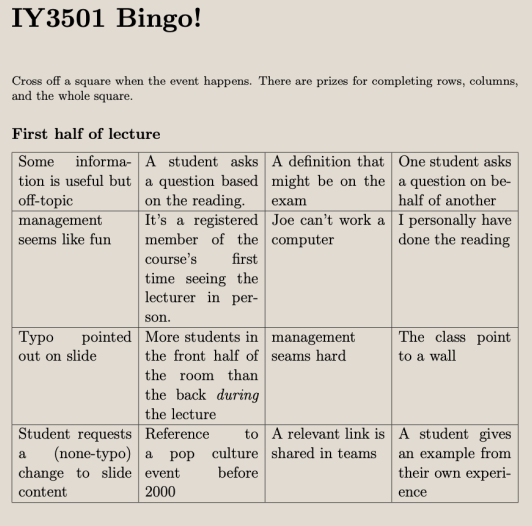Bingo! Teaching prize
I believe that a Computer Science Lecture with less than 16 questions or comments has failed. It has failed both for the students who have missed a chance to really break down the material and for the lecturer who has failed to understand that encouraging interaction is the best answer to the question “Why shouldn’t I watch this on YouTube?”.
I do a bunch of different things to try and hit the magic² 16 questions per lecture. One of them is Bingo.
I wrote a quick script (it’s on github) that produces 200 unique 16 square bingo grids based on events that might happen in a lecture. Here’s an example from the fourth lecture:

Students were handed a bingo card as they came into the room and won a prize for completing rows or columns during the lecture as per normal normal bingo rules.¹
The items on the cards came from several categories:
- Comical and under my control
- “Joe walks too far from the microphone”
- “A pop culture reference from before 1998”
- Comical and under the control of students
- “Someone’s phone goes off”
- Awareness of opportunity for integration
- “There is a typo on one of the slides”
- Interaction
- “A student asks a question based on the reading”
- “One student answers the question of another student”
- “A student gives an example from their own experience”
- “Someone asks a question without raising their hand”
- Personal interaction
- “I personally have done the reading”
- “I asked a question”
In the first week, items were split between the first three categories.
In the second week, items were split between the first four, which meant that students were regularly in the position that they had have ticked off three ‘easy’ items in a row but needed “A student answers the question of another student” to get a prize: thus they found themselves heavily incentivised to take part in order to win a very small plastic medal.
It was gratifyingly effective: there was a vast increase in engagement, not only from those few students who always ask questions, but from the set of students that engage much more rarely: this second group was always the target of the intervention and because they had been provided with a small amount of motivation they really blossomed.
It also provided some students ‘plausible deniability’ when asking questions: “I’m not some sort of nerd who cares, I’m just asking this detailed and thoughtful question because I want the small plastic medal”
As the course continued, I gradually removed many of the ‘silly’ options in favour of many more options from categories 4 and 5. After three lectures the system was set up so that lecture needed to have been highly interactive before anyone could complete a row: I would occasionally find students catching up on the reading during the break so that they could complete a column.
The results were: after three weeks of bingo, every additional lecture was a ‘success’: there were at least 16 questions/comments from the students and those questions came not just from the ‘uber-questioners’ (although many did)⁰ but also from the main body of the students. By the last few weeks of term, students were, unprompted, sharing information from their personal experience with each other about security legislation in their home countries, answering each other’s questions as a matter of routine and happily debating ongoing issues. This is incredible to see from a Computer Science group.
Obviously, with all such ‘cultural’ approaches, it only needs to be done for the first few weeks of a course; once the interactive culture has been developed the cards become unnecessary. In hindsight I probably ran this at least one more week than I needed to.
EDIT: I won a teaching prize!
Dear Joe
Many thanks for your submission: Creating a high-engagement culture for low-engagement students.
I’m very happy to say that the evaluators would like to award you a Prize. Congratulations.
If we are able to schedule a session of Prize-winners at the RHUL Education Conference on June 26th 2024, would you be able to give a short presentation for discussion please? If so, please could you let me know by May 28th?
Many thanks, and congratulations again.
Future Work
This is something of a toy intervention - I think it would make a good warm-up for the first few lectures before bringing in something much more drastic like an entirely flipped classroom
2024-2025 Academic Year
I used bingo in the first two lectures of the 24-25 academic year. The two small changes I made were:
- Limiting the number of medals available to five in each half.
- Making the second version explicitly harder (“nobody completed a row last year”).
Some numbers from the first session:
- There were 95 students.
- 89 sheets were handed out (apparently the remaining six students didn’t want to be involved).
- 36 sheets were left behind and not filled in.⁴
- 11 were left behind and filled in (none of these were completed, so the ten completed ones were taken away).
- 42 were taken away.
So, somewhere between 22% and 56% of students got involved. Notably, about half of the 11 sheets that were left behind had only the grid for the second half of the lecture filled in, suggesting that they were persuaded to participate after the event.
⁰ I have a standing instruction to the students that if they have a question they don’t want to ask themselves, they should message one of the students in the class who asks lots of questions.
¹ For prizes, I bought a set of these plastic medals from eBay: https://www.ebay.co.uk/itm/255374839916?var=555345310549
² And yet arbitrary…
⁴ I spoke sternly to the students about littering in the next lecture, so I only did this data collection once.